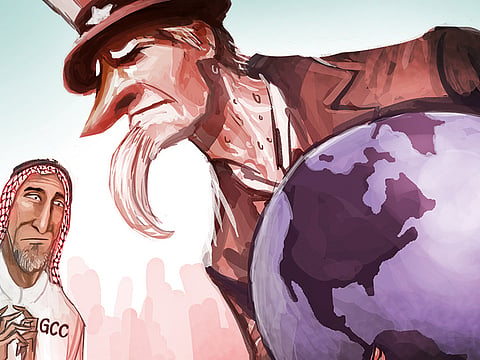Trump must reassure Middle East allies
The US president needs to send a clear signal that the alliance with the GCC is firm, and spell out a coherent strategy during his visit to Saudi Arabia

Although GCC states have welcomed, albeit with guarded optimism, the tough talk and bold move from the Trump administration on the Middle East, there are lingering doubts on the steadfastness of the administration and its commitment to GCC security.
Only last week Trump said in an interview, “Frankly, Saudi Arabia has not treated us fairly, because we are losing a tremendous amount of money in defending Saudi Arabia.”
According to Reuters, Trump’s criticism of Riyadh was a reminder of his 2016 election campaign rhetoric when he accused the kingdom of not pulling its weight in paying for the US security umbrella.
Trump’s rhetoric contradicts not only the reassurances he gave to Saudi Arabia’s King King Salman Bin Abdul Aziz in his phone call during his first days in office, but undermines what had been termed a successful visit by the kingdom’s Deputy Crown Prince and Minister of Defence, Mohammad Bin Salman to Washington.
It also contradicts the reassuring statement made by General Mattis, US Defence Secretary, as he praised Saudi Arabia’s leading role in the region.
For far too long, GCC allies have been underappreciated, taken for granted, pushed around and not been consulted over many strategic issues. This has led to friction with US administrations, especially with the Obama administration, where differences over many strategic issues were laid out in the open.
This no doubt has created a trust deficit between GCC states and the US. Buoyed by Trump’s tough talk and strong stance vis-a-vis the Middle East, GCC states had hoped that with the Trump administration in office, things would begin to look up and that both sides could see eye-to-eye and work together, restoring their relationship to equal footing.
U-turns
On top of their feelings of being underappreciated, what is further worrying GCC states and other US allies is Trump’s propensity to take “foreign policy U-turns, [something] that make his next moves difficult to predict.” This keeps the GCC and other GCC allies uncertain about the Trump administration’s commitments.
Then there is the Justice Against Sponsors of Terrorism Act (Jasta), a law passed by the Republican-dominated US Congress on the eve of the US presidential and congressional elections in the face of President Barack Obama’s veto. If the act is not amended, it may undermine investment flows between GCC states and the US, especially as Trump strives to attract more investment for job creation to fulfil his campaign slogan and promises that he will make America great again.
The Trump administration crosses its 100-day mark with limited success in unifying a polarised nation. His popularity is sagging, not withstanding his macho image overseas riding on the fact that he has launched more raids in Yemen in two months than the Obama administration did in an entire year, in addition to attacking the Syrian regime for gassing his people with Tomahawk missiles, and dropping the ‘Mother of all Bombs’ in Afghanistan.
Analysts note that these are not full-fledged strategies that reassure allies and scare foes. The New York Times summed it up on the 100th day of Trump in the White House, saying: ”Trump rallies some around the world, but repels others... The new presidency has reverberated worldwide, fuelling some far-right groups, weakening others and stirring doubts about America’s status as a global exemplar.”
Today, the Middle East is a big mess in the aftermath of the Arab Spring, and the splintering of the states and societies — from Syria to Iraq to Yemen and beyond. It is littered with failed states, fragile societies, dashed hopes and an uncertain future. On top of that there is a dreadful fight within Islam itself.
No wonder there have been growing hopes and expectations that Trump would reverse this downward spiral and deal, in a much more decisive manner, with the crises afflicting the Middle East.
Trump, in his first 100 days in office, was forced to deal with a host of crises ranging from the belligerent and defiant North Korea, which has conducted eight ballistic missile tests — some unsuccessful — since Trump took office; to changing tunes over Iran’s design in the Middle East, reaching a conclusion that Iran is the problem and not the solution that needs to be stopped and contained together with its proxies.
Aligning the strategies of the US and its GCC partners, Trump — in his upcoming visit to Saudi Arabia this month — should send a clear signal that the US-Saudi-led GCC alliance is firm and both sides stand to gain from a strengthened alliance.
The president’s repeated rhetoric has to be harnessed into a coherent strategy. There is also a need to put to rest his rhetoric on the cost of protecting US allies, when he is actually protecting his country’s own interests, and inform him that GCC allies are shouldering their own burden at no cost to US taxpayers.
Maybe someone should remind Trump that the role of leadership often comes at a heavy price.
Professor Abdullah Al Shayji is a professor of Political Science and the former chairman of the Political Science Department, Kuwait University. Twitter @docshayji.



